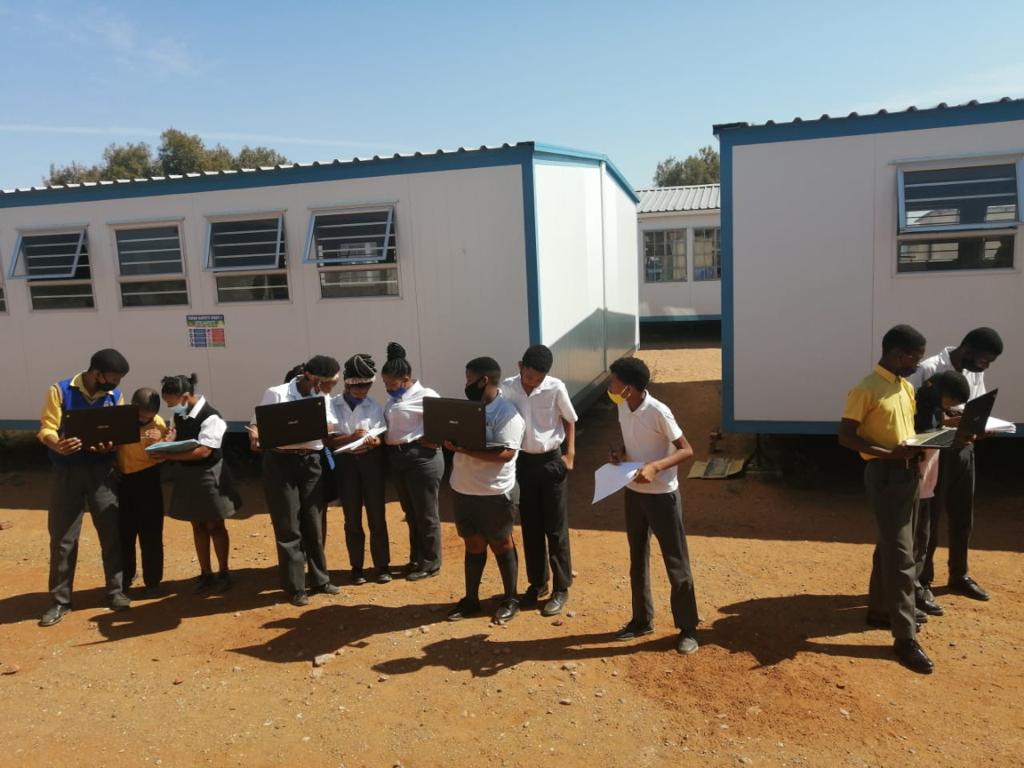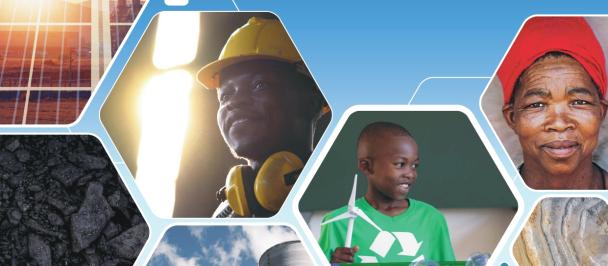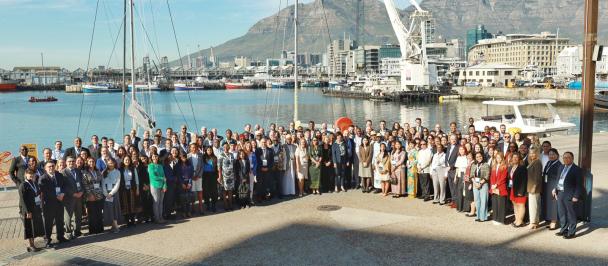Meet-up with Gauteng-based learners and educators at the Embassy of Denmark in South Africa.
Youth empowerment, gender equality and Science, Technology, Engineering and Mathematics (STEM) are all vital aspects for the achievement of the internationally agreed Sustainable Development Goals (SDGs). Access to quality education remains one the key challenges threatening Africa’s development in the era of rapid technological advancement. This especially applies for girls, who are significantly underrepresented in STEM related fields. Only 28% of science researchers are women in Africa, while 72% of men occupy STEM landscape.
The UN Development Programme (UNDP) in South Africa, in partnership with an array of organisations - FEMSTEM (Pty) Ltd (FEMSTEM), Sci-bono Discovery Centre in Johannesburg (Sci-Bono in short), and the UN Children’s Fund (UNICEF) – therefore launched the ‘Think Big Start Small: Youth-led Robotics for Multi-dimensional Climate Solutions’ (‘Youth in Climate Robotics’ in short) pilot project to equip educators and high-school learners across South Africa with skills in STEM fields, including robotics and coding. Supported by the Embassy of Denmark in South Africa, the project is one of several UNDP initiatives towards a youth-driven digital and sustainable development in South Africa, especially in the area of climate change.
The pilot project was designed to target both the need for skills development in the digital economy as well as the need for increased environmental awareness, and the application of digital skills to solve energy (SDG 7), climate (SDG 13) end environment (SDG 15) related challenges.
Over a six months period, a series of Climate, Space and Robotics training workshops - delivered by the Director of FEMSTEM, Judi Sandrock, and her team - a cohort of 25 educators and more than 150 students have been trained, both online and in-person in those areas where students do not have access to devices and internet for online learning. The beneficiaries come from eight different provinces and more than 50% are women and girls. The educators and learners took part of this project in their private capacity and all activities took place on evenings and weekends to not interfere with weekday classes.
“The Youth in Climate Robotics project forms part UNDP’s greater commitment to youth empowerment and sustainable development, particularly SDG 7, 13 and 15. It is the hope that involved educators and learners, equipped with new skills and inspiration, will go on to lead a generation of climate conscious South African youth who are committed to the mission of mitigating the negative impacts of climate and environmental changes, serving their communities at both a local and national level. The project is also an example of UNDP’s active engagement with the Paris Agreement on climate change mitigation and adaptation – aiming to generate action, at international, national and local level toward a sustainable world.” – Dr Ayodele Odusola, Resident Representative, UNDP South Africa.
As South Africa is on its journey to shape and enable a 4th Industrial Revolution (4IR) and harness the full potential of the digital economy, capacitating young people with the necessary skills is driving South Africa closer to taking full advantage of the endless opportunities that the digital economy offers. It is increasingly recognised that Internet of Things, Blockchain, Virtual Reality, artificial intelligence, big data, smart technology, the list can go on – components of what is called the 4IR – are the future and that the digital revolution has great potential to do good for more people, both better and faster.
As the UN SDGs integrator, UNDP has a global digital strategy — the first of its kind in the UN system —that charts a course to leverage digital innovation both inside the organization and in service lines to countries around the world. Digitalisation is also one of the three enablers identified in the new UNDP Strategic Plan 2022-2025, where UNDP is committed to support countries to build inclusive, ethical and sustainable digital societies.
The digital revolution also has the potential to catalyse a green and sustainable economy. As the world is facing the great challenge of climate change, threatening the prosperity of the planet and future generations, it is important that youth are not only educated about climate change, but are also empowered to become future climate problem-solvers.
The project has been enabled by support from the Embassy of Denmark in South Africa, as well as UNICEF in South Africa, two partners that are passionate youth-led climate action.
“Denmark is committed to contribute to empowering South African women and youth and to support innovative and sustainable development in South Africa. Digital skills are one of the most important assets of today, and certainly also the future. Our hope is that the effects of this project will multiply and steadily grow as educators train more students and learners can put their skills into practice over the coming years”, H.E. Tobias Elling Rehfeld, Danish Ambassador to South Africa.
“Young people are leading the way in climate action. An urgent and collective response, with children and young people at the center, can still prevent the impact of climate change from becoming even worse.” - Christine Muhigana, Representative, UNICEF South Africa.
Despite the challenges faced at the height of the 3rd wave of the COVID-19 pandemic in South Africa, meaning that most project activities had to be conducted virtually, beneficiaries have been able to pursue practical experiments concerning solar energy, greenhouse gases and data monitoring related to natural resources through XinaBox xChips kits that were sent to their home. FEMSTEM is an award-winning company and the implementer of the globally recognized XinaBox STEM programme in South Africa, offering virtual workshops and space camps for learners and accredited facilitator trainings.
Xinabox xChips pictures supplied by Judi Sandrock, FEMSTEM
Apart from technical and interactive workshops, educators and learners have been able to participate in inspirational and technical guest lectures. One was organised by the project partner Sci-Bono - a nationally and globally recognised science centre that offers world-class learning experiences in math, science and technology. The Science Talk was themed ‘Our next great challenge: youth in energy and climate change’ and featured three young professionals in the climate and energy space that shared their knowledge and experiences with young learners interested in pursuing a future career in the intersection between technology and environmental sustainability.
Educator Colleen Urquhart, a community STEM facilitator under the project in rural Northern Cape shares about the importance STEM education, especially for rural kids who often left behind. “Access to Science and Technology enables our learners to gain a place at the table when it comes to new and exciting careers that are emerging as a result of the 4IR. Early exposure to these skills gives our learners the confidence to compete with other learners who come from more privileged backgrounds. My role is to inspire, encourage and equip interested learners with what they may need to make this possible.”
Sun light measurement experiments in Douglas, Northern Cape, using the XinaBox xChips.
Sun light measurement experiments in Douglas, Northern Cape, using the XinaBox xChips
Promotion of youth climate & robotics champions
In addition to contributing to increased capacity in digital skills and technological opportunities, the project aimed to develop local and youth-led climate solutions as well to promote and celebrate youth climate champions emerging from the project. At the end of the training programme, learners were challenged to submit innovative robotics ideas aimed at solving problems related the targeted SDGs – 7, 13 and 15. A wide range of ideas emerged such as protection of solar panels, reduction of over-fertilization of crops and soil moisture warning using smart technology. Then a final award ceremony was held at Sci-Bono Discovery Centre on the 9th of October 2021, where all participating learners and educators were graduated and awards presented to five exceptional learners and two dedicated educators:
· Most Innovative Robotics Projects:
o SDG 7 – Affordable and Clean Energy: learner Grace Pakuda
o SDG 13 – Climate Action: learner Nandi Zuma
o SDG 15 – Life on Land: learner Tahirah Ahmed
· Project Team Player: learner Shiven Phlad
· Best Overall Performance: learner Tafara Mutero
· Project Ambassador: learner Grace Pakuda
· Most Learners Engaged: educators Colleen Urquhart and Denise Schemel
I applied to participate in the project because I am passionate about STEM as I know that STEM skills are needed for success across a variety of tasks and disciplines. I want to gain as much knowledge as I can and develop as many skills as I can because I am eager to use my knowledge and skills to find solutions to different issues in environment. Especially climate change regarding which is a vital issue that is threatening us all. – Grace Pakuda, learner and Youth in Clinate Robotics participant.
Award winners Shiven Phlad, Nandi Zuma, Tahirah Ahmed, Tafara Mutero and Grace Pakuda
Award winner Grace Pakuda and H.E. Tobias Elling Rehfeld, Danish Ambassador to South Africa.
Although only a few learners and educators could be recognised at the Award Ceremony, the impact of the project is far greater. This unique pilot project tackling youth skills, climate change and digital revolution has contributed to developing capacity and confidence in digital skills and technological ideas to the next generation of climate influencers and climate problem solvers, which has enabled their preparedness for further higher education, training or entrepreneurship opportunities for future green economy markets.
The participating educators and learners have with passion absorbed new knowledge in areas of the 4IR and sustainable development. They have also shared and developed new ideas and strategies that will contribute not only to taking themselves to the next steps in their careers, but also to the design of future projects of this kind. The key take-away from this project truly is Think Big, Start Small. As the UNDP we hope that this first of its kind pilot project is only the beginning and that the approach can be further be developed together with partners in South Africa to continue to empower South African youth in STEM fields and sustainable development.
Written by: Tove Nordberg and Ntokozo Mahlangu

 Locations
Locations







